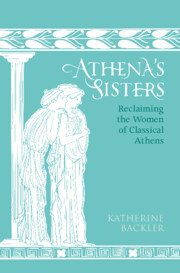Refine search
Actions for selected content:
24595 results in Ancient history
Part VI - Afterword
-
- Book:
- Women, Wealth and Power in the Roman Republic
- Published online:
- 20 February 2026
- Print publication:
- 19 March 2026, pp 329-340
-
- Chapter
- Export citation
Chapter 7 - “Feasts and Harlots, Baths and Idleness”
- from Part II - War and Agency
-
-
- Book:
- War and Community in Late Antiquity
- Published online:
- 09 January 2026
- Print publication:
- 19 March 2026, pp 180-207
-
- Chapter
- Export citation
Chapter 6 - Warfare, Communities, and Landscapes in Late Antique North Africa
- from Part II - War and Agency
-
-
- Book:
- War and Community in Late Antiquity
- Published online:
- 09 January 2026
- Print publication:
- 19 March 2026, pp 151-179
-
- Chapter
- Export citation
Chapter 13 - There Will Be Blood
- from Part IV - Women and Crisis
-
-
- Book:
- Women, Wealth and Power in the Roman Republic
- Published online:
- 20 February 2026
- Print publication:
- 19 March 2026, pp 249-267
-
- Chapter
- Export citation
Chapter 10 - “By Divine Inspiration and the Greatness of His Mind”
- from Part III - Civil War and Christian Roman Emperors
-
-
- Book:
- War and Community in Late Antiquity
- Published online:
- 09 January 2026
- Print publication:
- 19 March 2026, pp 285-328
-
- Chapter
- Export citation
Chapter 8 - Redemptio Captivorum
- from Part II - War and Agency
-
-
- Book:
- War and Community in Late Antiquity
- Published online:
- 09 January 2026
- Print publication:
- 19 March 2026, pp 208-248
-
- Chapter
- Export citation
Epilogue
-
-
- Book:
- War and Community in Late Antiquity
- Published online:
- 09 January 2026
- Print publication:
- 19 March 2026, pp 380-398
-
- Chapter
- Export citation
Tables
-
- Book:
- War and Community in Late Antiquity
- Published online:
- 09 January 2026
- Print publication:
- 19 March 2026, pp viii-viii
-
- Chapter
- Export citation

The Judgment of the Provinces
- The Roman Empire and the Origins of Law and Society
- Coming soon
-
- Expected online publication date:
- March 2026
- Print publication:
- 31 March 2026
-
- Book
- Export citation
What is Religion?
- European Thought from Antiquity to the Present
- Coming soon
-
- Expected online publication date:
- March 2026
- Print publication:
- 31 March 2026
-
- Book
- Export citation

A Narratological Commentary on Herodotus' Histories
- Coming soon
-
- Expected online publication date:
- March 2026
- Print publication:
- 05 March 2026
-
- Book
- Export citation

Visiting the Oracle at Dodona
- Contexts of Unknowing in Ancient Greek Religion
- Coming soon
-
- Expected online publication date:
- February 2026
- Print publication:
- 12 March 2026
-
- Book
- Export citation

Athena's Sisters
- Reclaiming the Women of Classical Athens
-
- Expected online publication date:
- January 2026
- Print publication:
- 12 February 2026

Women, Wealth and Power in the Roman Republic
-
- Published online:
- 20 February 2026
- Print publication:
- 19 March 2026

Sidonius Apollinaris: Selected Letters
-
- Published online:
- 20 February 2026
- Print publication:
- 22 January 2026
-
- Textbook
- Export citation

The Subura of Rome
- Landscape and Ideology from the Iron Age to the Early Middle Ages
-
- Published online:
- 20 February 2026
- Print publication:
- 31 March 2026
Preface to the Second Edition
-
- Book:
- The Cambridge Introduction to the Old Testament
- Published online:
- 30 January 2026
- Print publication:
- 19 February 2026, pp xv-xvi
-
- Chapter
- Export citation
Abbreviations
-
- Book:
- Calendar, Cult, and Law in Rome to the Age of Augustus
- Published online:
- 28 January 2026
- Print publication:
- 19 February 2026, pp x-xii
-
- Chapter
- Export citation
2 - Word of Truth: Word of God
-
- Book:
- The Cambridge Introduction to the Old Testament
- Published online:
- 30 January 2026
- Print publication:
- 19 February 2026, pp 17-32
-
- Chapter
- Export citation
12 - Land
-
- Book:
- The Cambridge Introduction to the Old Testament
- Published online:
- 30 January 2026
- Print publication:
- 19 February 2026, pp 194-215
-
- Chapter
- Export citation
